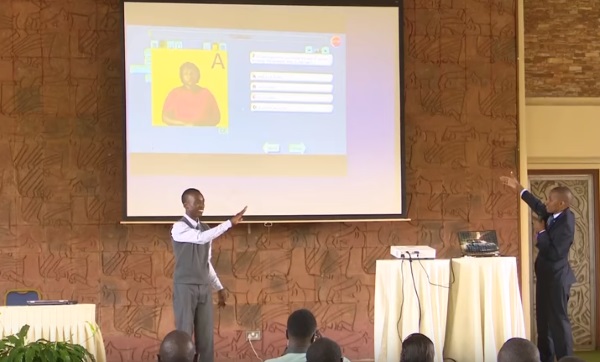From 2013 to 2015, researchers from the Makerere School of Public Health spent time collecting data for two surveys. One; for a hidden population and another; on HIV and the quality of life among people with speech and hearing impairment. “There are many risk factors among these deaf for example sexual cohesion was as high as 20%, rape was high as 20%.” Said, Dr. Geofrey Musinguzi – Research Fellow, MakSPH. “So one of our aim in this study is to actually find out how high is the HIV prevalence in this population and also to do an estimation of the size of this population.” Said, Prof. David Serwada – Researcher, MakSPH.
The information was gathered through audio computer self-administered interviews. Prof. David Serwada, a Researcher at the Makerere School of Public Health explained that this provided a safer way of interaction. “Computer-assisted data collection has been on well now, evaluated in different populations as a very good way of getting sensitive information.” Results from the survey showed that HIV and Syphilis were the commonest infections. They estimated the HIV prevalence was highest in female sex workers at 31.3% and people with multiple partners at 25% in a sample size of 2,807 people. Syphilis was the highest among people who use drugs at 23.5% and lowest among transgender women without any tally.
The Report on the quality of life and HIV and Syphilis infections showed that majority of the respondents lived a moderate quality of life. The study was done among 1,011 people. The HIV prevalence for this category of people stood at 1.9% in greater Kampala. Dr. Geofrey Musinguzi, a Research Fellow at the Makerere School of Public Health said there was more to be done in matching the equality of people with speech and hearing impairments in service provision. “For example going to TASO, they go to TASO and then they are not able for example to get a sign-language interpreter but yet they have gone for a service.” At the Research dissemination meeting, some of the participants raised several complaints. “With TASO, we don’t have a service we had at Crane Survey which could ask are you positive or negative.” Dr. Patrick Tumwine, the Commissioner for Disease Control under the Health Ministry welcomed the Survey. He urged the Researchers to do it country-wide. “The people we are working with, the information is not sufficient and so how do you plan for people you don’t know how many you have, you don’t know how big the burden is.” Said, Dr. Patrick Tumwine – Commissioner, Disease Control MOH.

